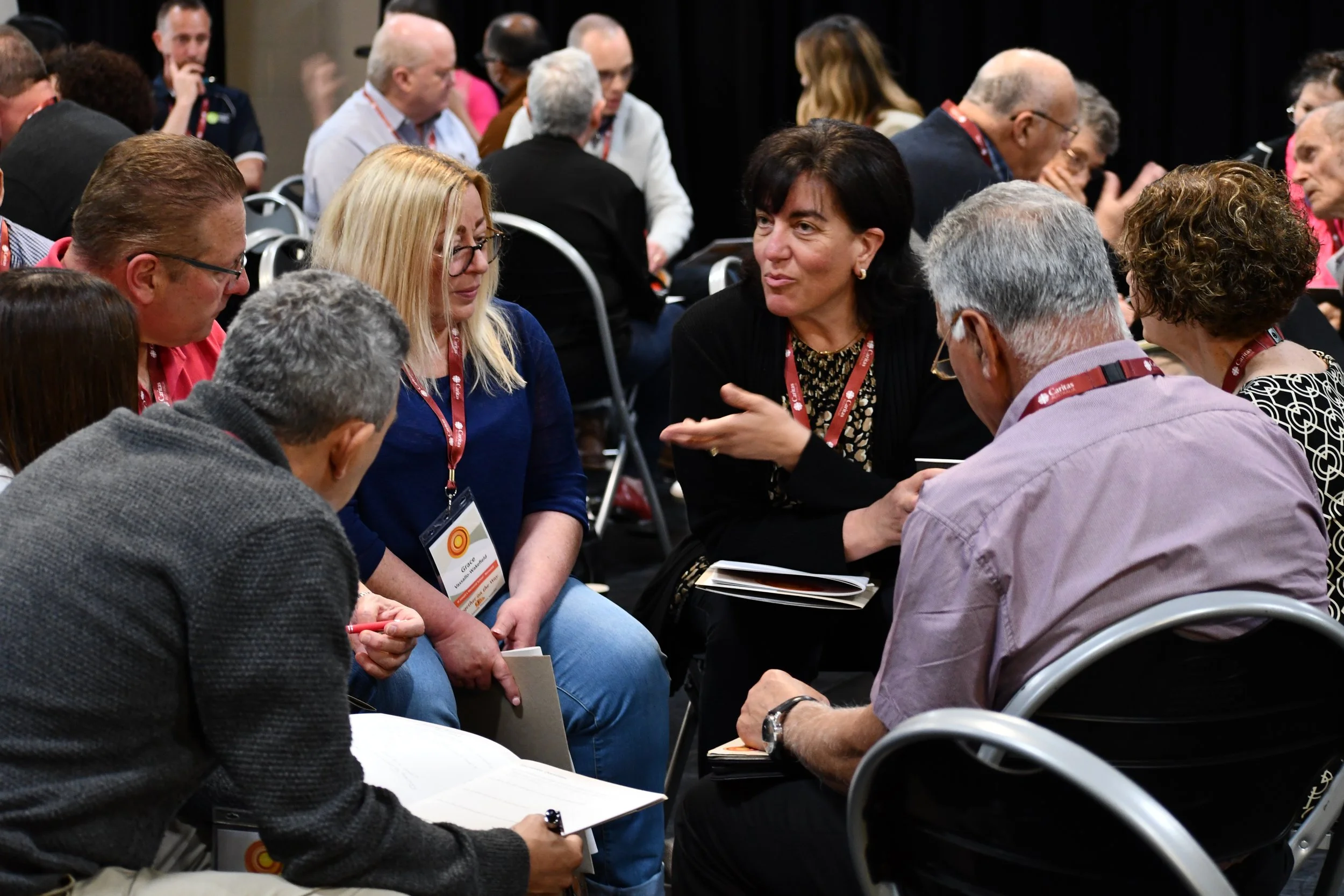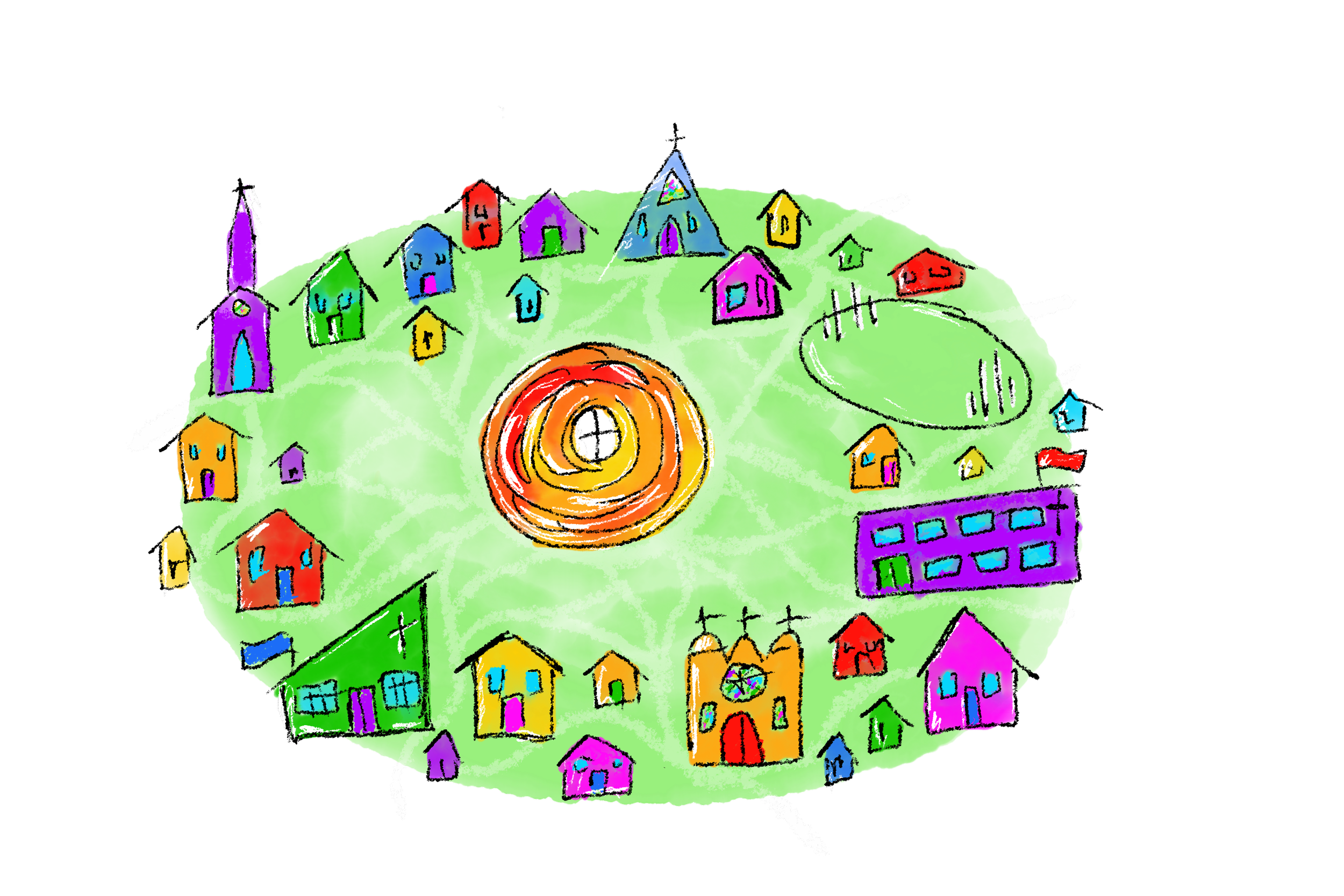Dates of Regional Assemblies
Region 1 – Planning in progress (Metro City/Eastern suburbs)
Region 2 – Assembly held in March 2023 (Metro Western suburbs)
Region 3 – Assembly planned for 4 May 2024 (Metro Mid-southern suburbs)
Region 4 – Assembly 9 March 2024 at Cardijn College (Metro Southern suburbs/Fleurieu Pen./ KI)
Region 5 – Assembly held on 2 September 2023 at Salisbury Parish (Metro Northern Suburbs)
Region 6 – Assembly held on 4 November 2023 (Regional Mid North/York Peninsula)
Region 7 – Assemblies held in Murray Bridge (12 Nov), Lameroo (19 Nov), and Tailem Bend (3 Dec). (Regional Eastern parishes)
Region 8 – Planning on hold (Regional South Eastern parishes)
Region 9 – Assembly held on for 29th October 2023 (Adelaide Hills / Mount Barker)
Regional Assembly Toolkit
The Regional Assemblies are a continuation of the 2021 and 2022 Diocesan Assemblies and are intended to involve a greater number of people at the local level. The Regional Assemblies will offer parishes, communities and schools an opportunity to practice synodality through mutual listening, developing responses to shared needs, and collaboration.
The items contained in this toolkit are suggestions, not mandates. Each Regional Planning Team will determine the best strategies to suit the needs of their own context.
What’s Included
Planning Steps
Step by step instructions to set up the planning team, develop the agenda, and implement the Regional Assembly event.
Event Checklist
Checklist, event logistics and best practices to ensure the best possible experience for your Regional Assembly.
Discernment Methods
Methods and process options for group discussions, spiritual conversations, strategic planning and decision-making.
Agenda Templates
It all begins with an idea. Maybe you want to launch a business. Maybe you want to turn a hobby into something more.
2021 Diocesan Assembly Recommendations
Review the list of recommendations which came out of the 2021 Diocesan Assembly.
2021 Diocesan Assembly Resources
Includes consultation information as well as pre-and post 2021 Assembly documents and resources.
Prayer Resources
All discernment is surrounded and supported by prayer. Prayer resources, environment and music suggestions, and Diocesan Assembly prayer resources.
2022 Diocesan Assembly Resources
Includes consultation information as well as pre-and post 2022 Assembly documents and resources.
The toolkit contains suggestions of methods and strategies to assist with planning. The end result is up to each Regional planning team to determine.
Regional Assemblies Online Information Session
FAQs
-
The Regional Assemblies are a continuation of the 2021 and 2022 Diocesan Assemblies. Holding them at the regional level allows more people to engage in the listening, dialogue and planning for mission. It is our hope that the Regional Assemblies initiate new opportunities for supportive and collaborative relationships and partnerships, as well as being an ongoing expression of the People of God, together on the way.
-
Every Region is different, so the timing will be different for everyone. We hope that every Region will be able to hold their Assembly before March 1st 2024.
-
The Pastoral Services Team of the Archdiocese is prepared to support each region as needed. We have developed several resources, guides and templates to assist in planning. A Pastoral Services Team member will be assigned to accompany each Region, and we have committed $10 per assembly participant in financial support. We want to see you succeed! If you need help, do not hesitate to ask.
-
There may be many reasons a particular parish, school or community is not able, or chooses not to participate in a Regional Assembly. We recommend that every effort is made to include them, but to carry with the Assembly regardless.
-
By Mid-March we will send out a revised list of the Regions after every parish, community and school has confirmed their region assignment.
-
No. It is up to each parish, school, or community to determine which region is most appropriate for their situation. Please let us know via assembly@adelaide.catholic.org.au by 1st March 2023 what region you will be a part of.
-
Parishes, schools and communities were sent the letter from the Archbishop at the end of January. Priests and APRIMs will continue to receive information, but the primary contacts will be those who are assigned in each region.
Essentials
-
Synodality is a spiritual practice. Prayer, both individually and communally, creates space to listen for and hear the Holy Spirit, to be open to what other people have to say, and to discern well. Prayer prepares us for commitment and action, and sustains us through difficulty, tension, and disagreement.
The Prayer for Communal Discernment and Prayer as well as other prayer resources are available for adaptation in the Regional Assemblies.
Global Synod Prayer and Spirituality Resources.
-
Listening is at the heart of synodality. significant portions of the 2021 and 2022 Diocesan Assemblies, as well as the consultation processes developed for the Plenary Council and Global Synod, focused on formation for listening well.
To be a participant in the Regional Assembly is an invitation to create space in your life for the ‘moment’ of the Regional Assembly. This is an invitation to feel excited about this space – the Regional Assembly will be a time out of the ordinary circumstances of your life. Therefore, you are invited to prepare yourself, heart, mind and body, for this experience.
Each of us brings to the Assembly our own experiences. We each bring a yearning, and we each bring an intention. This is one of the most important things to be aware of because we all have an intention to have our voice heard, to share our views, to be listened to and to be satisfied. So it is important to spend time thinking about our yearnings and intentions because our intentions influence or thoughts and therefore our behaviour.
• Come ready to participate fully in the sessions, prayers, listening, discussions, and discernment.
• Arrive early to the sessions.
• Get to know other members of our Regional family.
• Listen and dialogue with openness and respect in your discussion groups.
• Be curious.
• Be open to the movements of the Holy Spirit in the Regional Assembly.
-
The Assembly is not designed to be a debating space, or a platform to promote a particular agenda. Instead, the emphasis on listening creates space for reflective dialogue. Rather than preparing to say something while someone else is speaking, this kind of dialogue seeks to listen deeply and prayerfully to what the other is saying; allows space and time for reflection; and if necessary, a response is offered in order to expand the dialogue, ask questions, and come to mutual understanding.
Any time there is opportunity for dialogue, such as in the discussion group, it becomes a sacred space. In the group we have an opportunity to be honest, authentic and open with one another. This is only possible if we can agree to:
• Respectful listening and feedback – when someone is speaking, we are listening, not asking questions, critiquing or challenging.
• Honour one another’s experiences and opinions
• Treat one another with generosity and compassion
• Withhold judgement
• Keep the contents of our discussion confidential once we leave the session.
-
The recommendations and outcomes of the discussion groups should result from prayerful discernment. Discernment is a process of listening to God and arriving at answers in a prayerful way.
How do we know that we are listening to God and following the movement of the Spirit within ourselves or in a group? A good discernment process brings clarity and inner peace. If there is unease or anxiety, personal issues may be getting in the way.
The freedom to follow the Spirit of God moving in the group means having an open mind and heart. Group discernment requires a commitment to listen attentively and to trust the intentions of others, together with a willingness to share our own experience and insights, and let go of our assumptions or biases.
Plenary Council Resource: Introduction to Discernment
-
Simply talking about things won’t change things. We must commit to meaningful action. However, action without proper strategic planning and discernment will end up as ineffective or short-lived.
Commitment to action must also come from individuals, communities and the institution. It is not enough to say, ‘the Church needs to do X.’ We are the Church, so the responsibility to action rests on each one of us.
Action must also be followed by further prayer, reflection, and discernment.

![Youth-Assembly-850x455[1].jpg](https://images.squarespace-cdn.com/content/v1/6088c6f5fa79b552557e388a/1664502535034-512UIY9T3ODNZ9CUYPUY/Youth-Assembly-850x455%5B1%5D.jpg)

